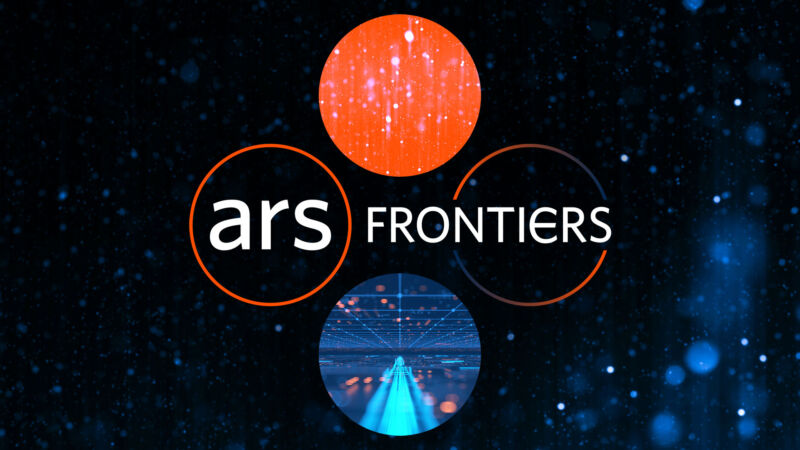
Aurich Lawson
Ars Technica is pleased to announce the return of Ars Frontiers, our one-day event exploring tech’s most pressing and fascinating issues. This year’s event will be held on May 22nd and everyone is invited! This year’s attendance is virtual, so we’ll be streaming all six sessions over three and a half hours.
Readers who stop by the front page every day already know that Ars is a leader in bringing together smart people to talk about important topics—whether it’s interviewing experts on current events or dissecting an issue in the comments with our more savvy readers. In the same spirit of encouraging great discussions, this year we have Eric Berger and Dr. We’ve curated a list of topics that explore the modern interconnectedness of innovation with panels led by our subject matter authorities like Beth Moll. All sessions will be streamed live on the Ars YouTube channel.
The main event
Ars Frontiers 2023 will consist of six virtual sessions on May 22, starting at approximately 13:30 US Eastern Daylight Time (-4 UTC). Ars Technica Editor-in-Chief Ken Fisher and I will host the event from our studio in Manhattan. Each session lasts about 30 minutes, which includes some time at the end for questions from the audience. Here’s the line up! (The session order may change between now and when the event occurs.)
Session 1: TikTok-banned or not, it’s probably here
Ars Senior Policy Correspondent Ashley Belanger will take on the current hot topic: With Congress and various states vowing to take action against TikTok, will “banning” (whatever “banned”) really come of it? What are the policy implications surrounding this type of regulation and how did we get here? Among the panel’s guests we’ll include EFF Legal Director Corinne McSherry.
Session 2: Beyond Covid-What does mRNA technology mean for disease therapy?
Ars Chief Scientist Dr. John Timmer has a panel on everyone’s favorite four-letter word in the 2020s: mRNA. Thanks to research generated by the COVID-19 pandemic, mRNA-based vaccines went from lab prototypes to commercial realities in an incredibly short time. But mRNA technology can extend beyond simple vaccinations—we can use it on other diseases as well. The panel was chaired by Dr. Featuring Karen Bock.
Session 3: Epidemiological Lessons from Epidemiologists
Ars Science writer and chief epidemic reporter Dr. Beth Moll has assembled a panel of infectious disease experts to look at what we’ve learned over the past three years and ours Next A contagion reaction might look like that. Brown University epidemiologist Dr. Beth will be speaking with a panel of others including Jennifer Nuzzo.
Session 4: The Internet is everywhere—satellites are suddenly sexy
Our Chief Space Correspondent, Eric Berger, talks about the rise of satellite Internet as a viable and accessible alternative to standard wireline Internet. What can travelers and locals around the world expect from fast, low-latency Internet anywhere on Earth? What will tens of thousands of orbiting satellites mean for our skies—and for the new space industry that launches them? Guests joining Eric for this panel will include Charity Weeden, Vice President of Global Space Policy and Government Relations at AstroScale.
Session 5: AI’s Lightning Strike—What’s Changed Suddenly?
A year ago, some of us heard about “ChatGPT”. Twelve months later, large language model-based AI threatens to forcefully revolutionize entire industries. What inventions led to this explosion of functionality? How did we get this far seemingly overnight? Ars AI reporter Benj Edwards dives into the topic with a panel of experts that includes Paige Bailey, principal product manager of generative models at Google.
Session 6: What Happens to Developers When AI Codes?
One area where large language models are making inroads is programming. The same basic skills that make LLMs good at putting English words together make them good at putting words together. All Types—including words in Python and Rust. I’ll put on a moderator’s hat for this panel and sit with a group that includes, among others, coding expert Katie Moussouris.
How to watch
We’ll be streaming the conference primarily on our YouTube channel, and we’ll embed a copy of the stream on the Ars Technica homepage on the day of the event. Each panel runs about a half-hour and includes some time for audience questions, which we pull from YouTube and from home article comments. It’s a wonderful opportunity to hear great minds talk about interesting topics, and everyone has a chance to make their voice heard in the comments.
It will be a packed day, but we hope everyone has at least a few minutes to stop by and stream the session. We’d love to see you there!
#Dont #Ars #Frontiers #Top #minds #talk #mRNA #TikTok #bans
